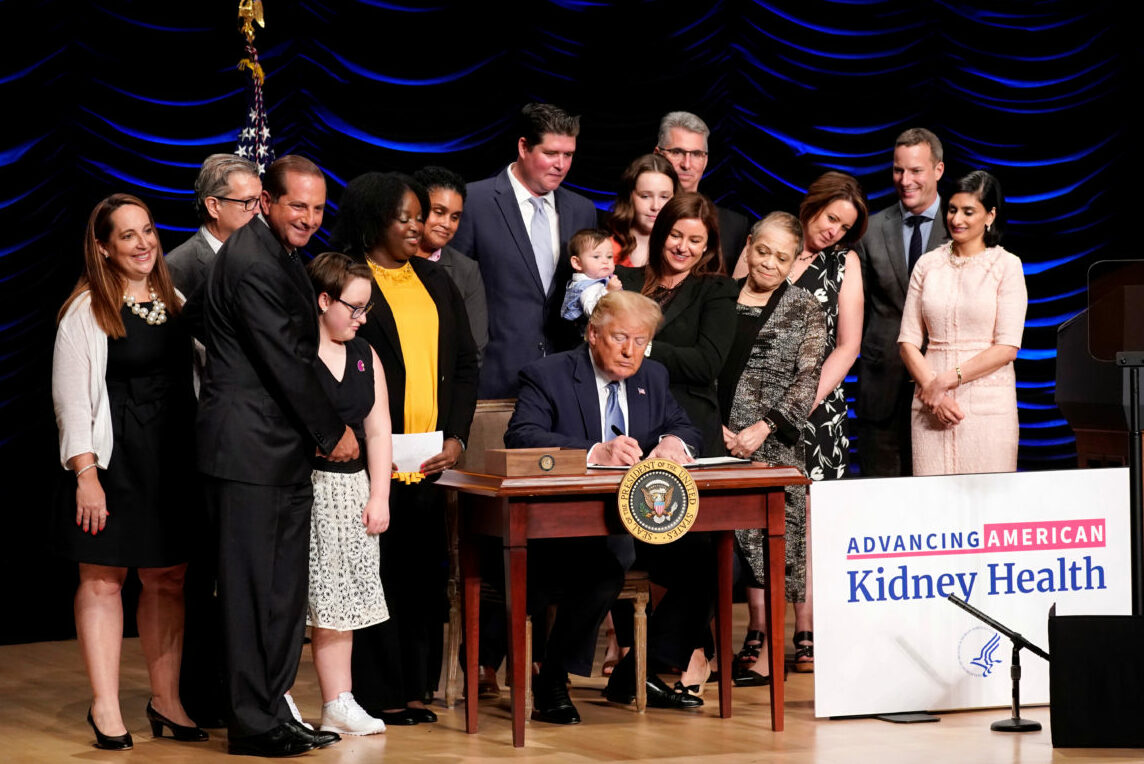July 17, 2019 – On Wednesday, July 10 President Trump signed an executive order creating the Advancing American Kidney Health program. The order seeks to reduce the number of Americans developing end-stage renal disease (ESRD) by 25 percent by 2030 and have 80 percent of new ESRD patients either receiving dialysis at home or receiving a transplant in 2025. During remarks, the president outlined three main initiatives:
- Improve detection, diagnosis and treatment, in part through a public awareness campaign to prevent patients from going into kidney failure;
- Double the number of kidneys available for transplant by 2030; and
- Increase access to affordable options for patients with end-stage renal disease.
Both the president and HHS Secretary Alex Azar rightly noted that the effort is the most significant kidney disease initiative taken by any president and the single biggest change to ESRD treatment since 1973.
The Centers for Medicare & Medicaid Services (CMS) is proposing five new payment models, four of which are voluntary, to support the program.
The mandatory model, ESRD Treatment Choices Model (ETC), is “focused on encouraging greater use of home dialysis and kidney transplants, in order to preserve or enhance the quality of care furnished to Medicare beneficiaries while reducing Medicare expenditures.” The model would adjust certain Medicare payments to nephrologists and dialysis providers according to their home dialysis and transplant rate from January 1, 2020, through June 30, 2026. The payment adjustment for year 1 is 3 percent and decreases to 1 percent in year 3. The proposed rule will be published in the Federal Register on Thursday, July 18 with a 60-day public comment period.
The four voluntary models are designed to help health care providers reduce the cost and improve the quality of care for patients with late-stage chronic kidney disease and ESRD. All four models are expected to run from January 1, 2020, through December 31, 2023, with the option for one or two additional performance years at CMS’s discretion. The models include the Kidney Care First (KCF) Model and the Comprehensive Kidney Care Contracting (CKCC) Graduated, Professional, and Global Models.
Under the KCF Model, participating nephrology practices will receive adjusted fixed payments on a per-patient basis based on health outcomes and utilization compared to the participating practice’s own experience and national standards, as well as performance on quality measures. In addition, participating practices will receive a bonus payment for every patient aligned to them that receives a kidney transplant based on the transplant remaining healthy for up to three years after the surgery.
All three CKCC models will offer capitated payments similar to those proposed in the KCF Model. However, the Kidney Contracting Entities (nephrologists, transplant providers, and other health care providers including dialysis facilities) will be responsible for the total cost and the quality for care for their patients. In exchange, they can receive a portion of the Medicare savings they achieve.
Thus far, kidney organizations, dialysis providers, and industry members have reacted positively to the plan.
Our Take
The importance of this cannot be overstated. There are two companies that have historically held a significant hold on the dialysis market and the underlying incentives around kidney care have failed to motivate a broader systemic change. Given the higher preponderance of kidney care under the Medicare market, the five payment models have the capacity to fundamentally shift the market. Companies who develop capabilities focused on prevention and in-home services through engagement and care coordination have the potential of creating differentiated value for providers who participate under this program. Further, if the systemic delivery infrastructure for kidney care services shifts, other government-sponsored and commercial managed care plans are likely to emulate these models.
This is an issue with bipartisan support with minimal risk of future disruption.


